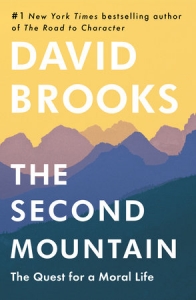RECOMMENDED READING
THE SECOND MOUNTAIN: THE QUEST FOR A MORAL LIFE
David Brooks
David Brooks plays many roles in his recent book, The Second Mountain: career coach, marriage counselor, gentle evangelist and community booster. Commitment is the theme binding these roles together. The thesis of the book is that the last 60 years of culturally promoted individualism have torn our society apart, and the cure is for everyone to commit to a communal purpose – not because Brooks says so but because working for a common good is the only way to find true meaning and live a joyful life.
A “second mountain” sounds a bit like a how-to manual for recalibrating after a first career and considering how to spend one’s remaining years. And the book is partly that. Brooks recognizes that most people enjoy the freedom to pursue their personal goals, and he does not judge the reader who works hard to buy a house, take vacations and otherwise enjoy creature comforts. But meeting these goals, however successfully, is just the first mountain. Brooks uses a little-known and pitch-perfect word – “acedia,” meaning “the quieting of passion” – to describe the effect of staying put on that first mountain: an underlived life that “instills a sluggishness of the soul, like an oven set on warm.” Only by doing the hard work of finding our true purpose – “[s]ome activity or some injustice [that] has called to the deepest level of your nature and demanded an active response” – do we find the vocation that is our second mountain.
Vocation is only one of the four commitments needed to build meaning, Brook argues. In a lengthy section on marriage, the once-divorced-now-remarried Brooks unabashedly stakes out the territory that marriage is the most important decision we will ever make and that people who struggle their way through to a long-term, permanent relationship achieve “the deepest steady joy you can find on this earth.” This is a bold claim to make in a world where much of his audience will never make it to that point. But he redeems this potential hypocrisy with an insightful discussion of what intimacy requires – total selflessness and a moral covenant to grow together. Stretching only a little to stay on theme, Brooks describes this level of commitment as “second-mountain love” – the love that occurs after the thrill of the first mountain, the valley of suffering, and now up on the heights of your larger and more selfless life together.”
The book ventures into riskier territory still when Brooks describes “a most unexpected turn of events”: the story of his path to becoming a questioning Christian while remaining “more Jewish than ever before.” His was not a conversion, he makes clear; rather, he remains inspired by the rituals and traditions of Judaism while being unable to “unread Matthew” and the beatitudes from the Sermon on the Mount. His recounting of a personal moment of grace, followed by years of doubt alternating with occasional flashes of belief, is thoughtful enough to engage even a committed agnostic, in part because Brooks speaks not as a preacher but as a fellow human trying to answer the unanswerable. The honesty of his struggle allows some forgiveness when he again stretches to get back to the book’s central theme of commitment with the observation that “[w]hen you’ve tied yourself to a spirit you can’t comprehend, nothing shocks you anymore, but everything brings you into a state of awe and wonder.”
The fourth commitment, to community, is critical, Brooks believes, to the restoration of a workable social system. The way to create such a system is through “people who are living on the second mountain, people whose ultimate loyalty is to others and not themselves.” A radical rethinking of community – not just being neighborly but creating a civic architecture where institutions collaborate rather than compete for resources, and with modern rituals of initiation, belonging and storytelling – is the only way out of the social isolation and distrust permeating American society .
The 16-page conclusion, titled “The Relationalist Manifesto,” may be the weakest link, as Brooks summarizes his ideas with a numbered and generalized list – admonishments like “…hyper-individualism gradually undermines any connection not based on individual choice – the connections to family, neighborhood, culture, nation and the common good” fall flat when compared to the specificity and vulnerability of the preceding 296 pages. But overall the book succeeds precisely because we are in the hands of a man who can write, beautifully and compellingly, about anything he puts his mind to, a man whose certainty that we must be shaken out of the decades-long frolic of “free to be me” and commit to something bigger than ourselves requires and repays our attention.
 This article was recommended by Susan Nash, a Visiting Scholar at the Stanford Center on Longevity.
This article was recommended by Susan Nash, a Visiting Scholar at the Stanford Center on Longevity.



